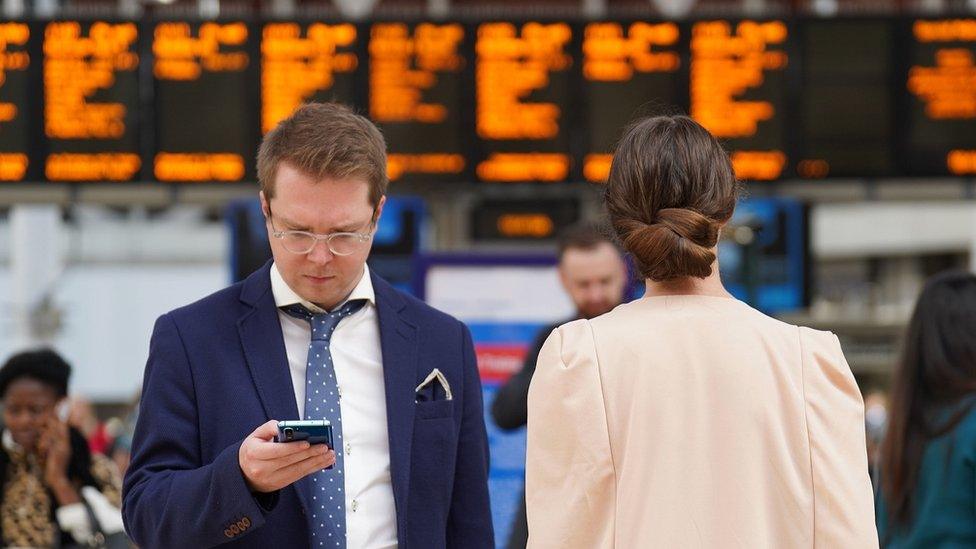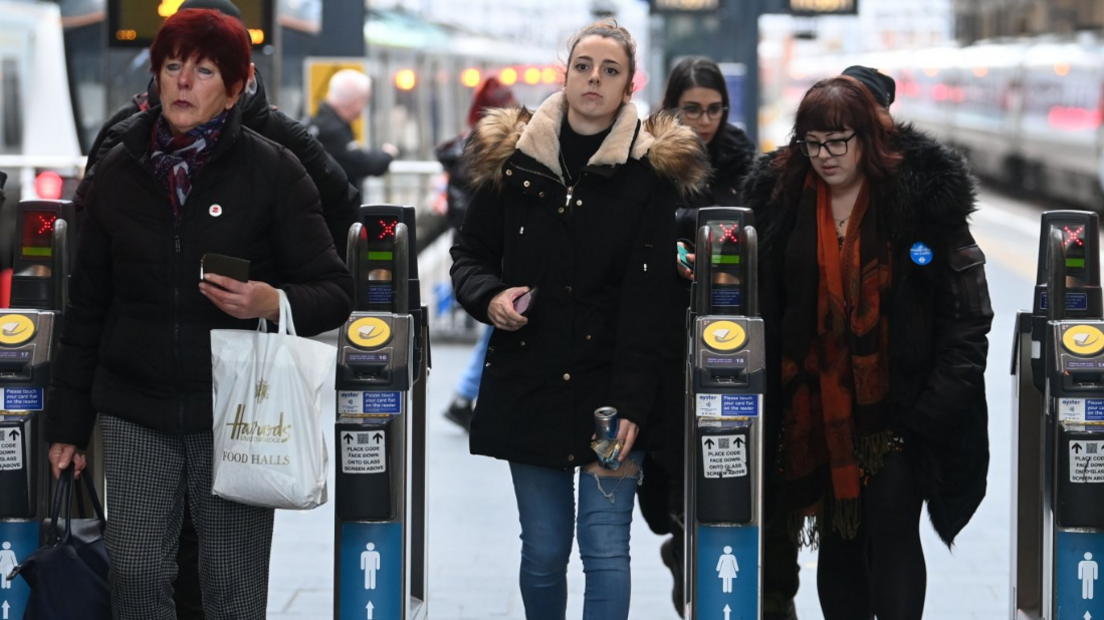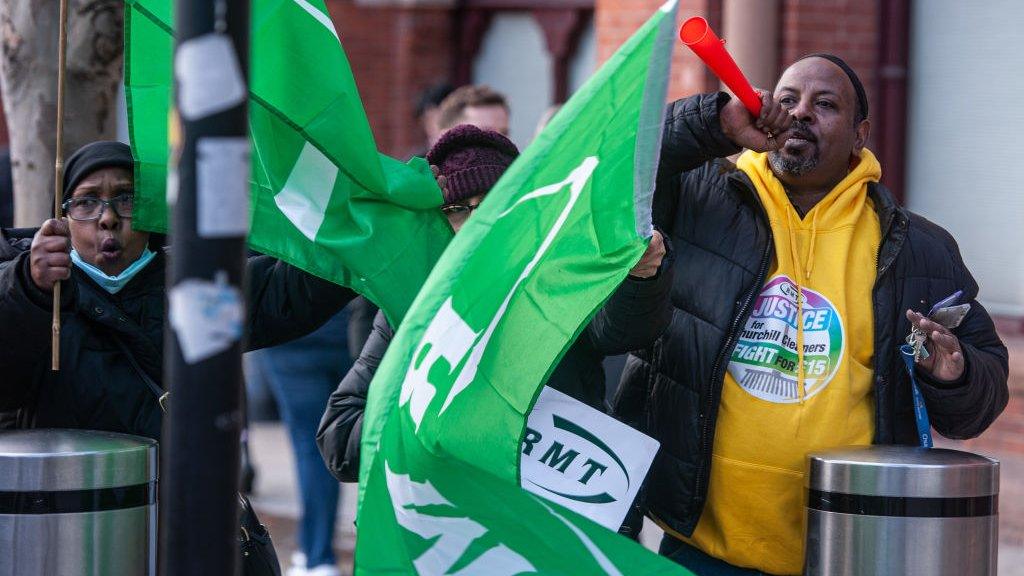December train strikes: Union told not to hold country 'to ransom'
- Published

A rail union has been told not to "hold the country to ransom" by a government minister after it announced plans for new strikes from Christmas Eve.
Workers at the UK's biggest rail union, the RMT, will walk out from 6pm on 24 December until 27 December as the row over pay and conditions escalates.
The strike could hit travel and celebrations over the festive weekend.
Government minister Nick Gibb said the union had rejected a pay offer without even consulting its own membership.
Speaking to BBC Breakfast, Mr Gibb, the Schools Minister, said the new strikes would affect the Christmas plans of "hundreds of thousands of people up and down the country" and urged the union to call them off.
RMT general secretary Mick Lynch said he regretted the inconvenience that was being caused by the strikes but argued it was "caused by the government who are running the playbook and the strategy for the railway companies and directing what's going on".
As well as the strikes on 24-27 December, industrial action across four 48-hour periods will take place on:
13-14 December
16-17 December
3-4 January
6-7 January
About 40,000 rail workers across Network Rail and train companies are expected to walk out. There is likely to be disruption in the days around the strikes as well.
Julian Gold from Cambridge says the new strike dates will disrupt his family's Christmas.
His daughter is a student in London, but has a part-time job that will see her work until 19:00 on Christmas Eve.
"Travelling to London on Christmas Day to get her is not ideal, but nor is the prospect of my daughter spending Christmas Day alone," he said.

Julian Gold says the strikes feel like a "PR fail" for the RMT
He says he understands the difficulties with the cost of living, but "this just feels like a massive PR fail" for the RMT.
Meanwhile Sarah Harris, 28, lives in Kent but works in London. Her work's Christmas party is on 15 December but with strikes the next day, trains will finish early that evening.
"So I'll either be stranded in London or I'll have to leave early, which I'd rather not do as it's a big event," she says.

Sarah Harris needs to travel between Kent and London by train on the day before strike action
Other travel plans she has before Christmas are also set to be disrupted. "I get the rail workers want a salary increase but don't we all," she says.
Mr Lynch said the new strike starting on Christmas Eve was targeted at planned engineering works by Network Rail, although he acknowledged that passenger services would "wind down" earlier than usual on 24 December.
News of the extra strikes was met with dismay by the hospitality sector, which is facing disruption to trade at its busiest and most lucrative time of the year.
UK Hospitality chief Executive Kate Nicholls said the strikes would be "hugely damaging" .
"Our estimate of the cost of these strikes already stood at £1.5bn in lost sales and it's incredibly frustrating that a solution has yet to be reached," she said.
While Michael Kill of the Night Time Industries Association said it "will be the death knell" for many bars and nightclubs.
"In previous strike action days, we have seen in some cases up to 40% lost in trade, with billions of pounds in revenue in the balance over the holiday period, which they are relying on to survive," he said.
The rail sector is not the only industry facing strike action, and walkouts are expected to affect postal deliveries, bus services and teaching in schools this month. On Tuesday, ambulance staff across many parts of England and Wales said they will strike on 21 December.
Workers are seeking better working conditions and pay increases to keep up with the soaring cost of living, as prices rise at the fastest rate for 41 years.

The RMT is involved in two sets of talks. One is with Network Rail, where RMT members include signallers and maintenance workers. The other talks are with the Rail Delivery Group (RDG), which represents the 14 train companies.
Network Rail had said the latest offer was its "best and final". It includes:
A 5% pay rise this year and 4% next year
No compulsory redundancies for workers who are not managers until 31 January 2025
A 75% discount on leisure travel for staff and their family members
On Monday, the RMT said it would put the new offer from Network Rail to its members in an electronic referendum. But it is calling for the offer to be rejected, describing it as "not acceptable".
Labour's deputy leader, Angela Rayner, said the pay offer seemed "low" given the current cost of living crisis.
"Every single day that those workers have been on strike they've lost pay so they don't want to do this, they want to find a resolution," she added.
On Sunday, the RMT rejected the first offer from the RDG. The offer included:
A pay rise for staff of 4% this year followed by another 4% next year
Changes to working practices including repurposing or closing ticket offices and staff having new "multi-skilled" roles
Drivers operating the train doors on more services, although the RDG says guards will still be on board
No compulsory redundancies until April 2024.
Additional reporting from Rozina Siri

How will you be affected by the strikes? Share your experiences haveyoursay@bbc.co.uk, external.
Please include a contact number if you are willing to speak to a BBC journalist. You can also get in touch in the following ways:
WhatsApp: +44 7756 165803
Tweet: @BBC_HaveYourSay, external
Please read our terms & conditions and privacy policy
If you are reading this page and can't see the form you will need to visit the mobile version of the BBC website to submit your question or comment or you can email us at HaveYourSay@bbc.co.uk, external. Please include your name, age and location with any submission.
Related topics
- Published6 December 2022

- Published6 December 2022
- Published9 May 2024

- Published7 December 2022
